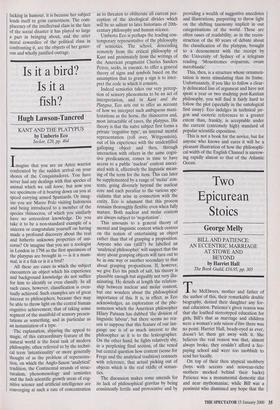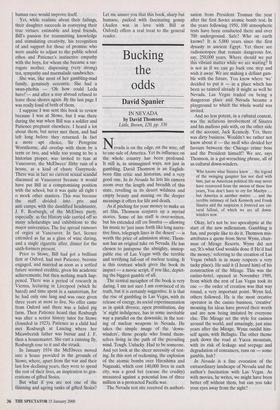Two Epicurean Stoics
George Melly
BILL AND PATIENCE: AN ECCENTRIC MARRIAGE AT STOWE AND BEYOND by Harriet Hall The Book Guild, f16.95, pp. 305 The McElwees, mother and father of the author of this, their remarkable double biography, denied their daughter any for- mal education. Patience's given reason was that she loathed stereotyped education for girls, Bill's that as marriage and children were a woman's sole raison d'être there was no point. Harriet Hall, beady-eyed as ever, doesn't let them get away with it. She believes the real reason was that, almost always broke, they couldn't afford a fee- paying school and were too snobbish to send her locally.
On top of their then atypical snobbery (boys with accents and nouveau-riche mothers mocked behind their backs) Patience was a monumental domestic slut and near mythomaniac, while Bill was a pessimist who dismissed any hope that the human race would improve itself.
Yet, while realistic about their failings, their daughter succeeds in conveying their true virtues: estimable and loyal friends, Bill's passion for transmitting knowledge and stimulating creativity, his recognition of and support for those of promise who were unable to adjust to the public school ethos and Patience's instinctive empathy with the boys, for whom she became a sur- rogate mother, dispensing (very strong) tea, sympathy and marmalade sandwiches.
She was, like most of her gambling-mad family, genuinely eccentric. She had a swan-phobia — 'Oh how could Leda have!'— and after a stay abroad refused to leave these shores again. By the last page I was really fond of both of them.
I suppose I was sent this book to review because I was at Stowe, but I was there during the war when Bill was a soldier and Patience pregnant elsewhere. I heard a lot about them, but never met them, and had left long before they returned. In fact a more apt choice, Sir Peregrine Worsthorne, did overlap with them by a term or two, and while too young to be a historian proper, was invited to teas at Vancouver, the McElwees' filthy ruin of a house, as a kind of chaste Ganymede. There was in fact no current sexual scandal discussed at Vancouver because it would have put Bill in a compromising position with the school, but it was quite all right t o mock other masters. This was because the staff divided into pro and anti camps, with the dandified headmaster, J. F. Roxburgh, of the McElwee party, especially as the History side carried off so many scholarships and exhibitions to the major universities. The foe spread rumours of orgies at Vancouver. In fact, licence extended as far as a glass of wine during, and a single cigarette after, dinner for the sixth-formers present.
Prior to Stowe, Bill had got a brilliant first at Oxford, had met Patience, become engaged, and married as soon as a settled future seemed credible, given his academic achievements; but then nothing much hap- pened. There was a period 'of research in Vienna, lecturing in Liverpool (which he hated) and time spent in a sanatorium, for he had only one lung and was once given three years at most to live. No offer came from Oxford and there was a failed pig farm. Then Patience heard that Roxburgh was after a senior history tutor for Stowe (founded in 1923). Patience as a child had met Roxburgh at Lancing where her Micawberish father was bursar and J. F. then a housemaster. She cast a cunning fly, Roxburgh rose to it and she struck.
In January 1934 the McElwees moved into a house provided in the grounds of Stowe, where, apart from the war and their last few declining years, they were to spend the rest of their lives, an inspiration to gen- erations of gifted Stoics.
But what if you are not one of the thinning and ageing ranks of gifted Stoics? Let me assure you that this book, sharp but humane, packed with fascinating gossip (Auden was in love with Bill at Oxford) offers a real treat to the general reader.



























































 Previous page
Previous page